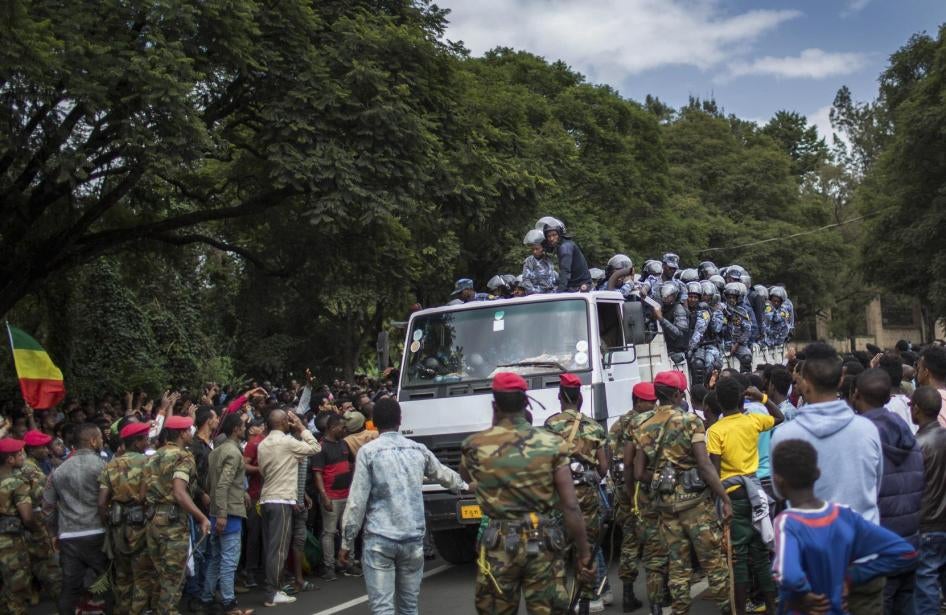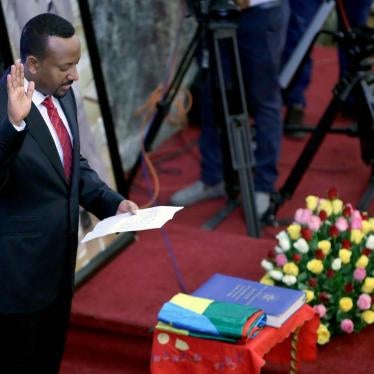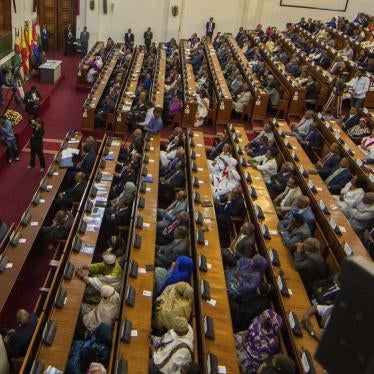One year ago this month, Dr. Abiy Ahmed was sworn in as prime minister of Ethiopia. His first few months in office saw many positive human rights reforms and a renewed sense of optimism following several years of protests and instability, along with decades of repressive authoritarian rule. Thousands of political prisoners have been released, a peace agreement has been signed with neighboring Eritrea, and Abiy has pledged to reform repressive laws. But in the months that followed, growing tensions and conflicts, largely along ethnic lines, have resulted in significant displacement and a breakdown in law and order across much of the country, threatening progress on key reforms.
This week we will publish a series of assessments of Prime Minister Abiy’s first year in office, looking at his government’s performance regarding eight key human rights priorities and providing recommendations on what more needs to be done in his second year in office, leading up to elections scheduled for May 2020.
Today, in Part 7 of 8, we look at the government’s performance on Accountability and Justice.
Accountability and Justice
There has been insufficient progress on accountability for past atrocities. The arrests of former officials, security force personnel, and others implicated in rights violations and corruption is a positive step, although it is hard to ignore the politicized nature of such arrests. There are still many people, including some who remain in government, who should be held to account for past crimes. The government has not presented a clear roadmap for how it plans to deal with the country’s abusive past.
Background
Under the ruling EPRDF coalition, Ethiopian institutions with the mandate to investigate human rights abuses including the judiciary, the Human Rights Commission and the ombudsperson have not been sufficiently independent to live up to that responsibility. The standard official response to allegations of abuse has been to deny any wrongdoing and to suggest that the claims were “politically motivated.” There are no known cases of abusive security officials being held to account for the crimes they committed. Ethiopia also strongly opposed international investigations, asserting that it can carry out such investigations on its own. For years, Ethiopia refused to invite UN special procedure mandate holders –that is, human rights monitors, at least 13 of whom had outstanding requests for invitations at the beginning of 2018.
In the Somali region, both the Ethiopian army and the region’s Liyu police force carried out widespread abuses against civilians for over a decade. The abuses have been particularly egregious since 2007, when armed conflict between the insurgent Ogaden National Liberation Front (ONLF) and the Ethiopian army escalated. Ethiopian authorities created the Liyu (“special” in Amharic) police, which by 2009 had become a prominent counterinsurgency force in the Somali Region. In a 2008 report, Human Rights Watch found that Ethiopian security forces and the ONLF had committed war crimes between mid-2007 and early 2008, and that the Ethiopian armed forces were responsible for crimes against humanity based on the documented patterns of executions, torture, rape, and forced displacement. Ethiopian authorities failed to conduct any meaningful investigations into the crimes.
Authorities also failed to meaningfully investigate the crackdowns against protesters beginning in 2015 in Ethiopia’s Oromia region. As the protests later spread to other regions, security forces killed over 1,000 people and detained tens of thousands between 2015 and early 2018. The deaths at the 2016 Irreecha Festival – when security forces used teargas and discharged firearms at an increasingly restive crowd causing a stampede that killed scores of fleeing people -- have also yet to be meaningfully investigated.
Earlier incidents of serious abuses by Ethiopian security officials have also gone unpunished, including the 2005 election violence and the 2003 war crimes by the Ethiopian military in the Gambella region. Soldiers, together with angry mobs of “highlanders,” massacred about 400 Anuak civilians in the town of Gambella in December 2003. The military then carried out a series of attacks on Anuak villages, destroying well over 1,000 homes and killing several dozen villagers.
Under Abiy
The prime minister and other senior officials have publicly acknowledged security force abuses. In Abiy’s early months, there was little discussion about accountability. But in November 2018, 63 people were arrested, including former government and military officials, and business people associated with the government affiliated Metals and Engineering Corporation (METEC). The officials from the former government and the military were suspected of human rights abuses while METEC officials were accused of corruption. However, many of them have not yet been charged and while their arrests sent a strong message that such abuses will no longer be tolerated the arrests were very selective and politicized. Several other high-profile officials associated with corruption under the previous government have also been arrested but not yet been charged.
The Attorney General’s Office removed five prison officials following a documentary on state broadcaster EBC in December about torture in detention. Human Rights Watch has not been able to confirm whether they have been charged. In July, the attorney general announced there would be an investigation into torture in places of detention. Human Rights Watch has not been able to confirm whether this investigation has, in fact, moved forward.
Some senior officials in Abiy’s government, including Workneh Gebeyehu, who was foreign minister until March, had senior and long-standing roles in abusive intelligence or security forces under the previous government.
According to Addis Standard, an independent news website, eight prison officials were charged in February with firing on inmates following the fire that broke out at Kilinto prison in September 2016, which killed 23 inmates.
Abdi Mohamoud Omar, commonly known as “Abdi Illey,” the former president of the Somali region, who commanded the abusive Liyu police, was arrested in August and eventually charged in January. But he was charged only for his role in the violence in August, when Somali youth groups attacked non-Somali groups in Jijiga, and not for the years of serious abuses the Liyu police committed under his command.
The new president of Somali Region, Mustafa Omar, a longtime human rights activist, has since he took office repeatedly stressed the importance of accountability for past abuses committed in Somali Region. Yet officials have not taken any known measures to investigate and prosecute senior members of the Somali Region Liyu Police and other Somali region officials who have been implicated in years of abuse in Jail Ogaden and throughout the region.
The government’s draft submission for its UN Human Rights Council Universal Periodic Review (UPR) states that “new legislation on police use of force and accountability” is being drafted and that it is “expected to create [a] clear, independent and effective complaint mechanism that would allow the submission of complaints concerning ill-treatment by security and law enforcement authorities.”
In November, Abiy announced plans to create a truth and reconciliation commission. Parliament passed a law to create such a commission, but little is known about the approach the commission will take or how truth and reconciliation processes will dovetail with investigations and prosecutions to hold the worse abusers to account.
What more can be done
The government needs to undertake wider efforts to hold accountable those most responsible for human rights violations. Accountability for the gravest crimes is crucial to building respect for the rule of law and contributing to the deterrence of future abuses. Investigating and prosecuting serious past crimes will require strengthening the national justice system, including to ensure credible and fair trials in accordance with international standards.
Those who have been arrested should be charged and brought to trial without delay.
Ethiopia needs comprehensive security sector reforms to ensure that security forces respect people’s rights and that there is an appropriate vetting process to ensure that officials responsible for serious human rights violations are removed. This includes federal, regional, and regional “Liyu” police forces. Those accused of past abuses should be charged and given a fair trial. Abiy’s government should establish a clear legal mandate for regional “Liyu” police forces across Ethiopia, with clear oversight systems.
Abdi Illey and other senior Somali Region officials should be subject to criminal investigation for crimes committed in the region over the past decade, and not just for violence committed against non-Somalis in August.
Meaningful independent investigations should encompass, at a minimum, the 2003 Gambella massacre and subsequent violence against Anuak communities throughout 2004, 2005 election violence, EDF war crimes and crimes against humanity in the Somali region in 2007 and 2008, Liyu police abuses in the Somali region since 2009, and excessive force used during protests, primarily in Oromia and Amhara regions, between 2015 and 2018. Investigations should have a mandate to recommend appropriate criminal charges for those most responsible for serious human rights violations.
Abiy’s government should publicly release reports and updates detailing the progress and results of investigations and of any actions taken against individuals implicated in abuse.
A truth and reconciliation commission could advance important goals, but it does not replace the need for fair, credible trials before courts of law and does not satisfy victims’ rights to have access to justice. The government should consider how to ensure an effective, robust approach to the truth commission and its relationship to investigations and prosecutions.









